海洋污染的英语演讲稿
海洋污染 英文作文

海洋污染英文作文英文:As a person who loves the ocean and cares about the environment, I am deeply concerned about the issue of ocean pollution. It is a global problem that affects not only marine life but also human health and the economy.One of the major causes of ocean pollution is plastic waste. Every year, millions of tons of plastic waste end up in the ocean, harming marine animals and disrupting the ecosystem. Plastic bags, straws, and bottles are the most common types of plastic waste found in the ocean.Another source of ocean pollution is oil spills. Accidents like the Deepwater Horizon oil spill in 2010 and the Exxon Valdez oil spill in 1989 have caused massive damage to the ocean and its inhabitants. Oil spills cankill marine life, contaminate water and shorelines, and disrupt the food chain.Overfishing is another problem that contributes toocean pollution. When fish populations are overexploited,it can lead to the collapse of marine ecosystems. This can result in an imbalance of the food chain, which can affect not only marine life but also the livelihoods of people who depend on fishing.To address ocean pollution, we need to take action at both the individual and governmental levels. As individuals, we can reduce our use of plastic, properly dispose of waste, and support sustainable fishing practices. Governments can implement policies to reduce plastic waste, regulatefishing practices, and hold companies accountable for their pollution.In conclusion, ocean pollution is a serious problemthat requires immediate attention and action. We all have a role to play in protecting the ocean and its inhabitants.中文:作为一个热爱海洋、关心环境的人,我深刻关注海洋污染问题。
海洋污染英文口头报告作文
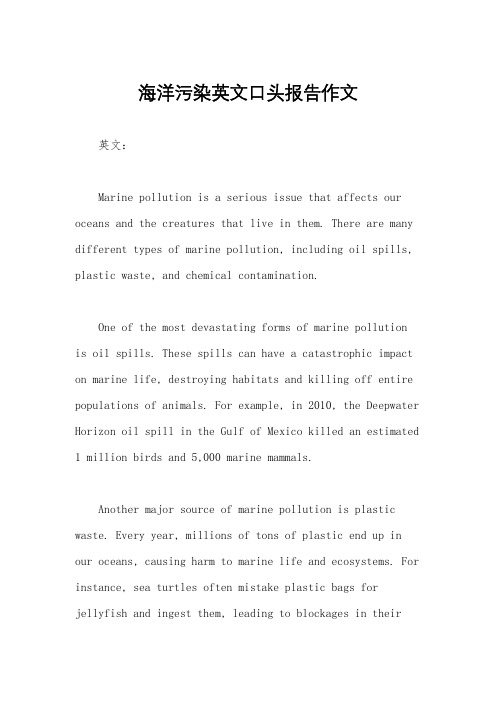
海洋污染英文口头报告作文英文:Marine pollution is a serious issue that affects our oceans and the creatures that live in them. There are many different types of marine pollution, including oil spills, plastic waste, and chemical contamination.One of the most devastating forms of marine pollutionis oil spills. These spills can have a catastrophic impact on marine life, destroying habitats and killing off entire populations of animals. For example, in 2010, the Deepwater Horizon oil spill in the Gulf of Mexico killed an estimated 1 million birds and 5,000 marine mammals.Another major source of marine pollution is plastic waste. Every year, millions of tons of plastic end up in our oceans, causing harm to marine life and ecosystems. For instance, sea turtles often mistake plastic bags for jellyfish and ingest them, leading to blockages in theirdigestive systems and ultimately death.Chemical contamination is also a significant problem in our oceans. Industrial waste, agricultural runoff, and sewage all contribute to the presence of harmful chemicals in our waterways. These chemicals can accumulate in the tissue of marine animals, leading to health problems and even death.中文:海洋污染是一个严重的问题,影响着我们的海洋和生活在其中的生物。
海洋污染英文口头报告作文

海洋污染英文口头报告作文Well, let me tell you about ocean pollution. It's a serious problem that affects not only marine life, but also humans who rely on the ocean for food and recreation.One of the biggest culprits of ocean pollution is plastic. Every year, millions of tons of plastic waste end up in the ocean, harming marine animals who mistake it for food or get entangled in it. It's a heartbreaking sight to see a sea turtle with a plastic straw stuck in its nostrilor a bird with a plastic ring around its neck.Another source of ocean pollution is oil spills. Whenoil spills occur, they can have devastating effects on marine life and ecosystems. Oil can coat the feathers of birds, making it impossible for them to fly, and it cankill fish and other marine animals by suffocating them or poisoning them.Chemical pollution is also a major problem in the ocean.Chemicals from agricultural runoff, sewage, and industrial waste can contaminate the water and harm marine life. Some chemicals can even bioaccumulate, meaning they build up in the tissues of animals over time, leading to health problems and even death.Overfishing is another issue that contributes to ocean pollution. When fish populations are depleted, it can disrupt the balance of the ecosystem and lead to the collapse of certain species. It's important to practice sustainable fishing practices to ensure that we don't deplete the ocean's resources.In conclusion, ocean pollution is a serious problem that requires immediate action. We need to reduce our use of plastic, prevent oil spills, regulate chemical use, and practice sustainable fishing practices. It's up to all of us to protect the ocean and the life it supports.。
污染海洋的英文作文
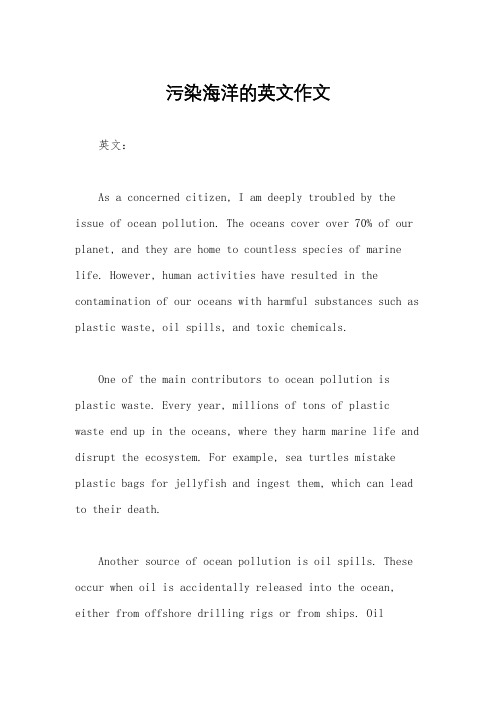
污染海洋的英文作文英文:As a concerned citizen, I am deeply troubled by the issue of ocean pollution. The oceans cover over 70% of our planet, and they are home to countless species of marine life. However, human activities have resulted in the contamination of our oceans with harmful substances such as plastic waste, oil spills, and toxic chemicals.One of the main contributors to ocean pollution is plastic waste. Every year, millions of tons of plastic waste end up in the oceans, where they harm marine life and disrupt the ecosystem. For example, sea turtles mistake plastic bags for jellyfish and ingest them, which can lead to their death.Another source of ocean pollution is oil spills. These occur when oil is accidentally released into the ocean, either from offshore drilling rigs or from ships. Oilspills can have devastating effects on marine life, as the oil can coat the feathers or fur of animals, making it difficult for them to move or breathe.Finally, toxic chemicals from industrial and agricultural activities can also pollute the oceans. These chemicals can enter the water through runoff or direct discharge, and they can harm marine life and even maketheir way into the food chain.Overall, ocean pollution is a serious problem that requires immediate action. We need to reduce our use of plastic, improve safety measures for offshore drilling and shipping, and regulate the discharge of toxic chemicalsinto the oceans. By taking these steps, we can help protect our oceans and the countless species that call them home.中文:作为一个关注环境的公民,我深感海洋污染的问题令人担忧。
保护海洋演讲稿英文简单
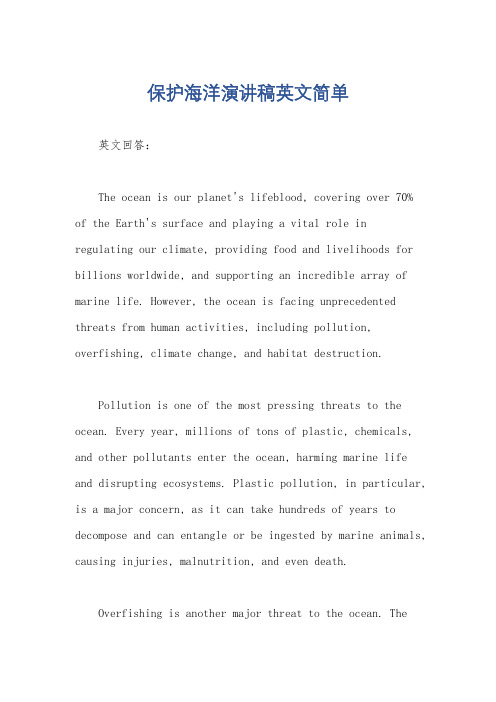
保护海洋演讲稿英文简单英文回答:The ocean is our planet's lifeblood, covering over 70%of the Earth's surface and playing a vital role inregulating our climate, providing food and livelihoods for billions worldwide, and supporting an incredible array of marine life. However, the ocean is facing unprecedented threats from human activities, including pollution, overfishing, climate change, and habitat destruction.Pollution is one of the most pressing threats to the ocean. Every year, millions of tons of plastic, chemicals, and other pollutants enter the ocean, harming marine life and disrupting ecosystems. Plastic pollution, in particular, is a major concern, as it can take hundreds of years to decompose and can entangle or be ingested by marine animals, causing injuries, malnutrition, and even death.Overfishing is another major threat to the ocean. Thedemand for seafood has grown exponentially in recent decades, leading to the overexploitation of many fish stocks. Overfishing can disrupt the delicate balance of marine ecosystems, leading to the collapse of fisheries and the loss of biodiversity.Climate change is also having a significant impact on the ocean. As the Earth's atmosphere warms, the ocean is absorbing more heat and carbon dioxide. This is causing the ocean to become more acidic and warmer, which can harm marine life and disrupt ecosystems. Climate change is also leading to sea level rise, which can threaten coastal communities and infrastructure.Habitat destruction is another major threat to the ocean. Coastal development, land-use changes, and other human activities can destroy or degrade important marine habitats, such as coral reefs, seagrass beds, and mangroves. These habitats are essential for the survival of manymarine species and provide important ecosystem services, such as food, shelter, and breeding grounds.The threats facing the ocean are complex and interconnected, and they require a comprehensive and collaborative approach to address. We all have a role to play in protecting the ocean, from reducing our plastic consumption to supporting sustainable fishing practices to advocating for policies that protect the ocean.We can all make a difference in protecting the ocean. By understanding the threats and taking action, we can help to ensure that the ocean remains a vital and healthy part of our planet for generations to come.中文回答:海洋是地球的生命之源,覆盖了地球超过 70% 的表面,在调节气候、为全球数十亿人提供食物和生计、以及支持种类繁多的海洋生物方面发挥着至关重要的作用。
海洋污染英语演讲稿

海洋污染英语演讲稿Ladies and gentlemen,Today, I stand before you to address a pressing concern that affects not only our oceans but also the well-being of our planet – ocean pollution. Ocean pollution, caused by human activities, is a global problem that demands immediate attention and collective action. It threatens the delicate balance of marine ecosystems, harms marine life, and ultimately affects the livelihoods of millions of people who depend on the oceans for their sustenance and survival.First and foremost, let us understand the various sources of ocean pollution. The disposal of plastic waste is one of the major contributors to this issue. According to recent studies, approximately eight million tons of plastic waste end up in our oceans every year. This plastic waste not only visibly damages and pollutes our beaches and shorelines but also poses a significant threat to marine life. Sea turtles, for example, often mistake plastic bags for jellyfish and ingest them, leading to their death. Additionally, industries and ships are major sources of chemical pollutants, such as oil spills, heavy metals, and toxins, which contaminate the water and pose severe threats to marine flora and fauna.Furthermore, the consequences of ocean pollution are devastating. Overfishing, driven by unsustainable fishingpractices, disrupts the delicate balance of marine ecosystems and threatens the survival of various fish species. Coral reefs, known as the rainforests of the seas, face extinction due to the increasing acidification of the water caused by pollution. This not only affects the colorful marine life that depends on coral reefs but also disrupts the coastal protection they provide against storms and tsunamis. Moreover, the polluted waters can lead to an imbalance in the oxygen levels, resulting in widespread death of marine life and creating dead zones where no life can survive.Additionally, promoting sustainable fishing practices and regulating the fishing industry can help restore the balance of marine ecosystems. Protecting and conserving endangered species and their habitats, such as coral reefs and mangroves, iscritical to maintaining the diversity and resilience of our oceans. We must also invest in innovative solutions, such as developing biodegradable alternatives to plastic and promoting the use of clean energy sources in industries and ships.Finally, individuals can contribute to the fight against ocean pollution through simple daily actions. For instance, using reusable shopping bags, reducing single-use plastics, properly disposing of waste, and participating in coastal clean-up activities can make a significant impact on reducing ocean pollution.In conclusion, ocean pollution is a global crisis that demands immediate action from all stakeholders. It threatens marine life, disrupts ecosystems, and affects the livelihoods of millions of people. By raising awareness, implementing strict regulations, promoting sustainable practices, and taking individual actions, we can all play a role in preserving our oceans for future generations. Let us join hands and work together to protect our oceans and ensure a sustainable future for all. Thank you.。
保护海洋演讲稿英语作文
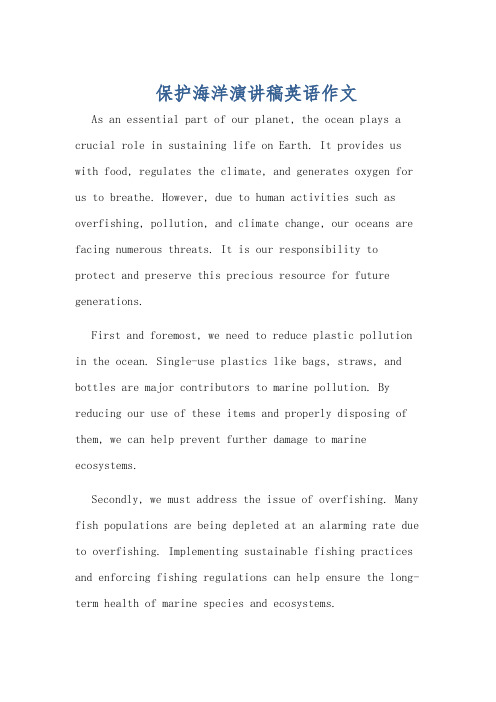
保护海洋演讲稿英语作文As an essential part of our planet, the ocean plays a crucial role in sustaining life on Earth. It provides us with food, regulates the climate, and generates oxygen for us to breathe. However, due to human activities such as overfishing, pollution, and climate change, our oceans are facing numerous threats. It is our responsibility to protect and preserve this precious resource for future generations.First and foremost, we need to reduce plastic pollution in the ocean. Single-use plastics like bags, straws, and bottles are major contributors to marine pollution. By reducing our use of these items and properly disposing of them, we can help prevent further damage to marine ecosystems.Secondly, we must address the issue of overfishing. Many fish populations are being depleted at an alarming rate due to overfishing. Implementing sustainable fishing practices and enforcing fishing regulations can help ensure the long-term health of marine species and ecosystems.Furthermore, climate change is having a profound impact on our oceans. Rising sea levels, ocean acidification, and coral bleaching are just a few of the consequences of a warming planet. We must take action to reduce our carbon footprint and mitigate the effects of climate change to protect our oceans.In conclusion, the health of our oceans is vital to the health of our planet. By taking steps to reduce plastic pollution, combat overfishing, and address climate change, we can help protect and preserve this critical resource for future generations.作为地球的重要组成部分,海洋在维持地球上的生命中起着至关重要的作用。
海洋被污染英文作文
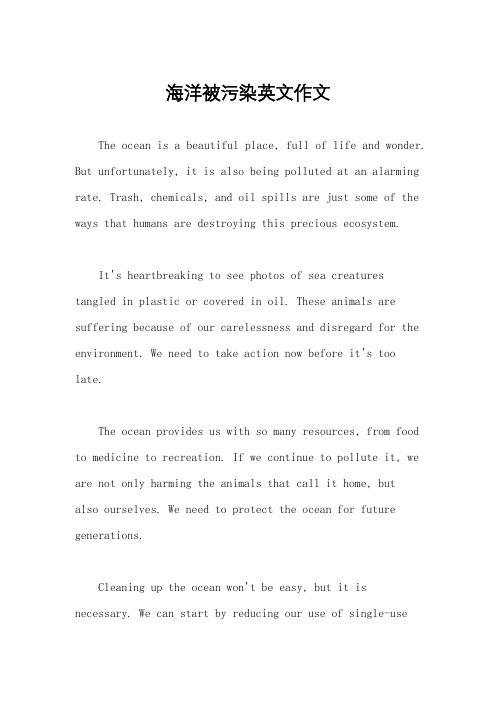
海洋被污染英文作文The ocean is a beautiful place, full of life and wonder. But unfortunately, it is also being polluted at an alarming rate. Trash, chemicals, and oil spills are just some of the ways that humans are destroying this precious ecosystem.It's heartbreaking to see photos of sea creatures tangled in plastic or covered in oil. These animals are suffering because of our carelessness and disregard for the environment. We need to take action now before it's too late.The ocean provides us with so many resources, from food to medicine to recreation. If we continue to pollute it, we are not only harming the animals that call it home, butalso ourselves. We need to protect the ocean for future generations.Cleaning up the ocean won't be easy, but it is necessary. We can start by reducing our use of single-useplastics, properly disposing of waste, and supporting organizations that are working to clean up the ocean. Every little bit helps.We can't afford to ignore the problem of oceanpollution any longer. It's time to take responsibility for our actions and make a change. The ocean is worth saving, and it's up to us to ensure that it remains a healthy and thriving ecosystem for years to come.。
- 1、下载文档前请自行甄别文档内容的完整性,平台不提供额外的编辑、内容补充、找答案等附加服务。
- 2、"仅部分预览"的文档,不可在线预览部分如存在完整性等问题,可反馈申请退款(可完整预览的文档不适用该条件!)。
- 3、如文档侵犯您的权益,请联系客服反馈,我们会尽快为您处理(人工客服工作时间:9:00-18:30)。
海洋污染的英语演讲稿
3海洋污染英语演讲稿
Sea pollution
Between 75 and 80% of marine pollution is caused by land, particularly agriculture. 30% of this is from the atmosphere. Around 12% of the pollution is caused by maritime transport.
In South America, 98% of domestic wastewater ends up, untreated, in the sea. The countries along the Mediterranean Sea throw 50 million tons of waste into it every year and the Chinese throw 60 million tons of waste into the Yellow sea daily. Over half of the hydrocarbon discharge comes from continents, 5% comes from oil tanker accidents, 20% comes from waste and other ship-related accidents, 4% from sea exploitation and 11 to 15% is due to natural causes. Accidental pollution through hydrocarbon is significantly decreasing and only represents a small percentage of waste through degassing estimated at between 1.5 and 3 million tons of oil a year. In 2023, according to the WWF, between 0.7 and 1.3 million tons of oil were spread by degassing in the Mediterranean. According to the Ifremer (the French Institute for Exploitation of the Sea), coastal water pollution cost the world economy almost 12.8 billion dollars in 2023.
Marine pollution is the result of products being thrown into seas and oceans, mostly by mnkind: domestic waste (sewage and rubbish, pollutants in runoff water...), industrial waste (hydrocarbons, metals, synthetic chemical and organic substances, radionuclides...) and agricultural waste (fertilisers, pesticides...).
This includes water pollution and marine sediments, and more generally all damage to marine ecosystems caused by harmful substances being discharged into the sea, either by their nature or their quantity.。
